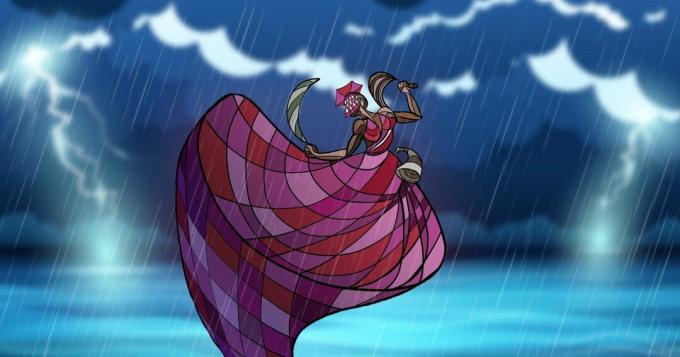The plagues of Egypt is a bible story, which recounts the punishments sent to Egypt by God, to force the deliverance of the Hebrew people from slavery.
In all, ten plagues were sent: water that turned to blood, infestation of frogs, lice and flies, plague in the cattle, ulcers on people, hail of stones, locust infestation, darkness and the death of the firstborn of the families.
The story is told in the Bible, in the book exodus of the Old Testament. The passage tells that God sent Moses and Aaron to meet Pharaoh (king of Egypt) to ask that the Hebrews be freed from slavery and be able to hold a cult. However, Pharaoh refused Moses' requests ten times and with each refusal, God sent a plague to the region.
In addition to forcing the freedom of the Hebrew people, the plagues also served the attempt to prove that egyptian gods did not exist or they were weak before the Christian God.
1. Waters turned to blood
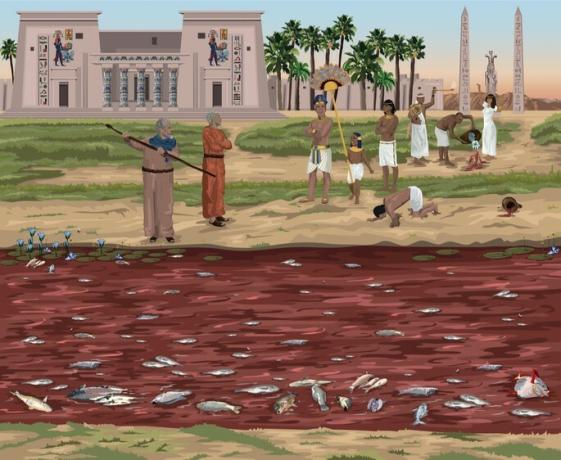
"Moses and Aaron obeyed the Lord's command. Under the eyes of Pharaoh and his people, Aaron lifted up his rod and smote the water of the Nile, which turned all into blood."
Exodus 7:20.
God instructed Moses to go with his brother Aaron to the Pharaoh of Egypt and ask for the freedom of the Hebrew people, who were held in slavery. Moses and Aaron did so.
After Pharaoh's first refusal to the request, Moses instructed his brother to touch the Nile River with a stick so that the water turned into blood.
O Nile is an important river for the region and considered divine by the Egyptians. The story tells that for seven days the river and its tributaries, as well as the springs and wells, turned into blood, causing fish and other animals to die.
After this period, Moses and Aaron returned to Pharaoh to repeat his request.
2. frog infestation
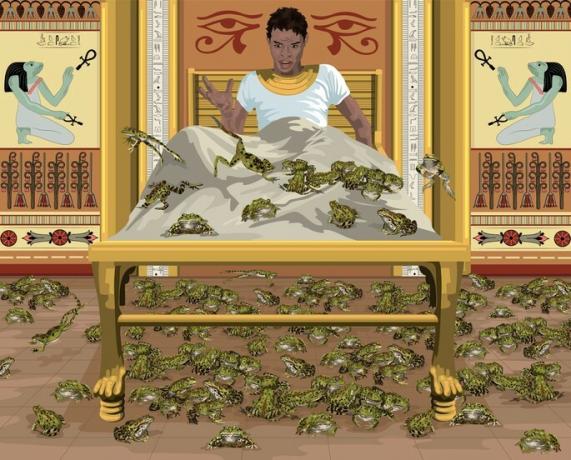
"The Lord said to Moses, "Go and seek Pharaoh and say to him: This is what the Lord says: Let my people go, that they may serve me.
If you refuse, I will infest your entire territory with frogs.
The Nile will boil with frogs that will come up to invade your dwelling, your room, your bed, the houses of your people, your ovens and your kneaders.
The frogs will come up on you, on your people, and on all your servants."
Exodus 8:1-4.
After Pharaoh's second negative response, God sent an infestation of frogs that spread throughout Egypt. With the region taken, Pharaoh appealed to Moses and Aaron and promised that if the frogs were removed, he would free the Hebrew people.
3. Mosquito (or lice) infestation
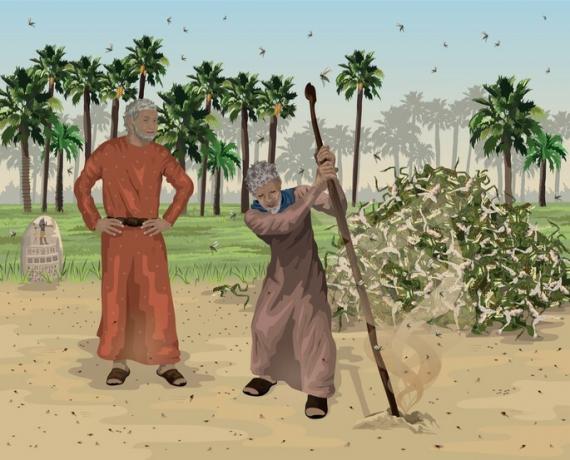
"The Lord said to Moses, "Say to Aaron, lift up your rod and smite the dust of the earth: it will become gnats throughout all Egypt."
Exodus 8:16.
After the promise of deliverance to the Hebrew people with an end to the frog infestation was broken, Moses and Aaron again asked for the freedom of the Hebrews, but Pharaoh denied it and God sent the third Prague.
The third plague sent has two interpretations, one version of the story says mosquitoes were sent to Egypt, the other claims it was lice. However, it is clear that the story was about insects that bit people, causing itching.
4. fly infestation
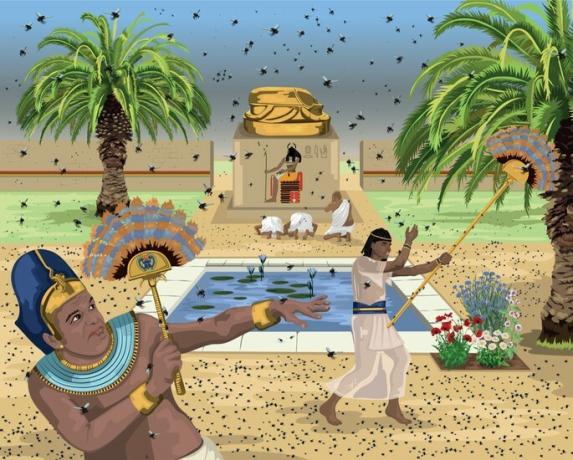
"The Lord said to Moses, 'You will go to Pharaoh in the morning when he goes out to go to the bank of the river, and you shall say to him, This is what the LORD says: Let my people go, that they may give me cult.
If you refuse, I will send flies over you, your people, your people, your houses: the houses of the Egyptians will all be invaded by them, as well as the land in which they live."
Exodus 8:20,21.
Again, Moses and his brother went to the king of Egypt to ask that the Hebrews be freed from slavery and be able to hold a service in honor of their God. When the pharaoh did not allow it, an infestation of flies was sent to Egypt.
Although, God's people (the Hebrews) were not hit by the plague. While the Egyptians suffered from the flies, the Hebrews were not attacked.
Pharaoh called Moses and Aaron and asked them to get rid of the flies. He proposed that the worship of God be carried out in Egypt, but Moses rejected the proposal because the type of worship would be frowned upon by the Egyptians, who could stone the Hebrews.
The king of Egypt agreed to release them if the flies disappeared. God made the flies disappear, but Pharaoh did not keep his promise and kept the Hebrews enslaved.
5. plague on animals
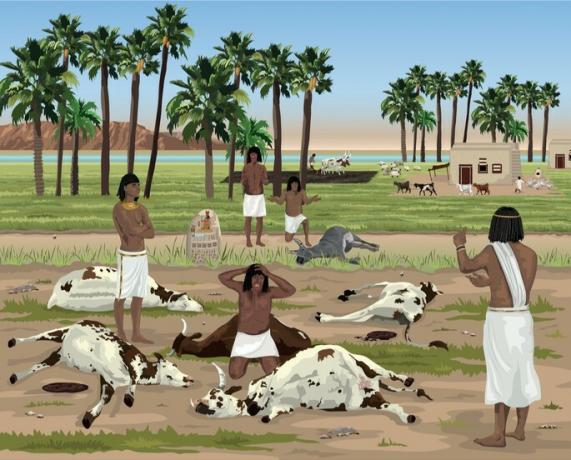
"If you refuse, if you persist in withholding him, the hand of the Lord will be heavy on your animals that are in the fields, on the horses, the donkeys, the camels, the oxen and the sheep: there will be a terrible plague.
However, the Lord will make a distinction between the animals of the Israelites and those of the Egyptians, and nothing will perish of everything that belongs to the Israelites."
Exodus 9:2-4.
As Pharaoh again denied a plea for the Hebrew people to be released, God sent a plague that made all the animals sick and died. Except the animals of the Hebrews, which remained healthy. The Hebrew people can also be called Israelites or Jews.
6. wounds and ulcers
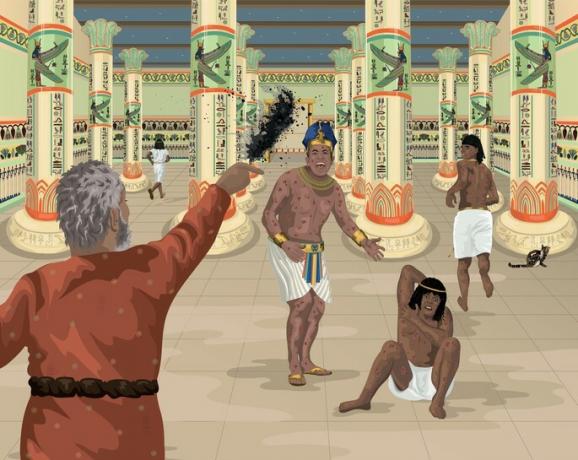
"The Lord said to Moses and Aaron, 'Take your two hands full of ashes from the oven, and Moses throw it into the sky before Pharaoh's eyes.
It will become dust that will spread over all Egypt, and there will be tumors in all Egypt, on men and on animals, tumors that will break out into ulcers."
Exodus 9:8,9.
For the sixth time, Moses and Aaron went to Pharaoh to ask for the Hebrews. But Pharaoh remained inflexible and did not effectively release the people. Then God sent the sixth plague, which made all the Egyptians, including Pharaoh and his family, sick with sores and ulcers all over their bodies.
7. stone rain
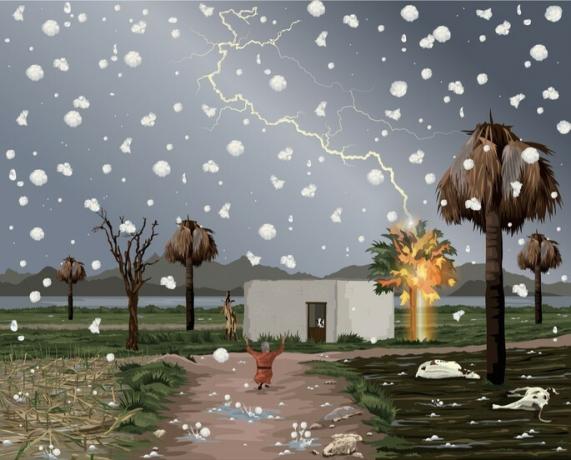
"The LORD said to Moses, "Tomorrow morning you shall present yourself before Pharaoh, and say to him, 'This is what the LORD, the God of the Hebrews, says: Let my people go, that they may give me a gift. worship, because this time I will unleash all my scourges on you, your people and your people, so that you may know that there is no one like me in all the earth.
(...) If you persist in preventing the departure of my people, tomorrow, at this very hour, I will cause a such a violent shower of stones as was never seen in Egypt, from its origin to the day of today".
Exodus 9:13-18.
After Pharaoh's seventh negative response, God sent a heavy hailstorm and fire to Egypt. But before that he instructed, through Moses, that whoever feared him should protect himself from the rain lest he die. Therefore, those who feared God survived the hail, those who feared not, died.
With the hailstorm, Pharaoh promised to free the Hebrews. However, after the hail had ceased, he did not keep his promise.
8. locust infestation
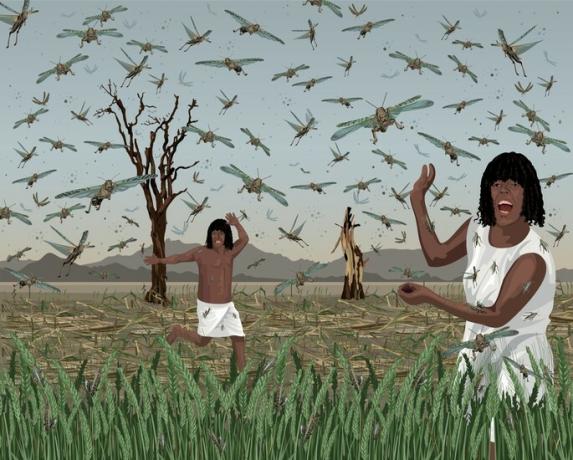
"The Lord said to Moses, 'Stretch out your hand over Egypt, that locusts may come upon it and invade Egypt and devour all the grass of the land, all that the hail has left.
Exodus 10:12.
With Pharaoh's eighth refusal to release the Hebrews, God sent for a day and a night a locust infestation that destroyed the Egyptian crops. Pharaoh apologized to Moses and Aaron and offered the people their freedom in exchange for stopping the infestation.
God commanded a strong wind to blow the locusts from Egypt to the Red Sea. However, Pharaoh again failed to fulfill the promise and the Israelites remained slaves.
9. Darkness (darkness)
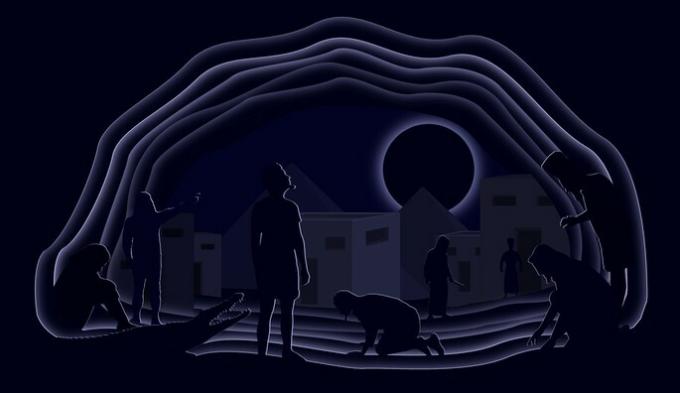
"Moses stretched out his hand toward heaven, and for three days thick darkness covered all Egypt.
During those three days, no one saw each other, and no one got up from where he was. Whereas all the Israelites had light in the places where they dwelt."
Exodus 10:22,23.
After Moses and Aaron's ninth request was denied by Pharaoh, God sent a darkness that dominated Egypt for three days. With, the darkness, the pharaoh promised to give freedom to the Hebrews, but they should leave their animals.
Moses explained to Pharaoh that the Hebrews needed animals to make sacrifices and worship the Lord. Pharaoh promised again to let the Hebrews go if the darkness would cease, but after having his request granted by God, he did not fulfill the promise.
10. death of the firstborn
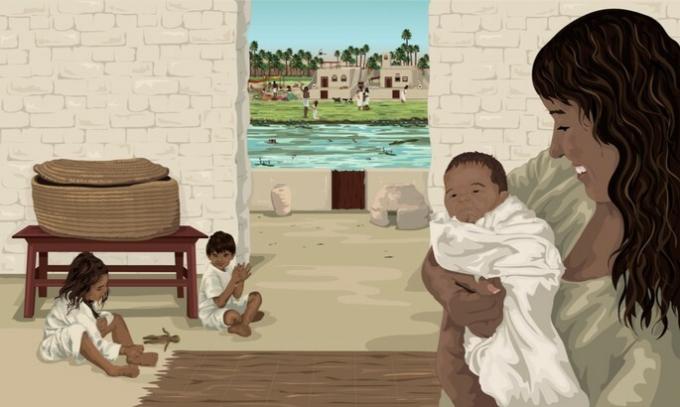
"In that night I will pass through Egypt, and I will smite the firstborn in Egypt, both man and beast, and I will execute my justice against all the gods of Egypt. I am the Lord.
The blood on the houses where you live will be a sign {of protection} for you: when I see the blood, I will pass over, and you will not be struck by the destructive scourge when I strike Egypt.
Exodus 12:12-13.
After Moses and Aaron's last request was denied, God sent the tenth and final plague on Egypt. This plague was responsible for killing the firstborn (first child) of all families, human and animal. Including the pharaoh's, ending his descendants who would assume the reign of Egypt.
To protect the Hebrews, God, through Moses, instructed that thethose who fear him should put lamb's blood on the doors of their houses.thus, when death befell the firstborn Egyptians, the families that had blood at their door would be spared.
With the death of your firstborn, Pharaoh freed the Hebrews from slavery and allowed them to go away and worship their God. The Hebrews departed, guided by Moses, and left Egypt.
The Relation of the Plagues to Egyptian Mythology
The interpretation of the passage that tells about the plagues of Egypt in the book Exodus, of the Bible, shows two goals of God when sending plagues to the region. In addition to the liberation of the Hebrew people from slavery, in some passages it is possible to notice the attempt to show that the Christian God was more powerful than the gods of Egyptian mythology.
Scholars relate each of the plagues to the weakening of an Egyptian god before his people. Egypt had a polytheistic culture (they believed in several gods) and these gods were anthropomorphic, that is, they had a human body part and an animal part. Some animals were also considered divine, such as cats.
Learn more about Ancient Egypt.
Therefore, when the Christian God sent the ten plagues to Egypt he would have been able to prove that the gods of local mythology did not exist or were weak, as they were unable to end the plagues.
See the relationship between each plague and the demoralization of the Egyptian gods:
| Prague | God or Goddess | Features |
| Nile waters turned to blood | hapi | Deity of the waters of the Nile. |
| frog infestation | herek | Goddess of fertility, she had the head of a frog. |
| Mosquito (or lice) infestation | Geb | God of Earth. |
| fly infestation | Khepri | Deity of the sun, had the appearance of a scarab. |
| plague on animals | Hathor | Goddess of love and happiness, she had the appearance of a cow. |
| ulcers and wounds | Isis | Goddess of magic, also related to ancient medicine. |
| stone rain | nut | Goddess of the sky and creator of the universe. |
| locust infestation | set | God of drought and destruction. |
| Darkness | Frog | sun god. |
| death of the firstborn | the pharaoh | He was seen as a kind of deity, descended from the god Ra. |
Did the plagues of Egypt really happen?
There is no scientific or historical evidence to certify that Egypt was actually hit by the plagues.. However, some researchers claim that the phenomena narrated in the biblical story could have natural causes.
The bloody Nile River could be a case of the phenomenon called red tides. The frog infestation could be a consequence of red tides, with the animals fleeing the waters without oxygen.
Already the infestation of mosquitoes, flies, plague in animals and ulcers in people could be related. For, the skin injured with the bites would attract flies, which are animals that usually provoke and develop in wounds, causing as a consequence the plague and ulcers.
The hailstorm would be a heavy hailstorm, caused by the eruption of a volcano in southern Europe. The three days of darkness could also be related to the eruption of a volcano.
The death of the firstborn would be related to an Egyptian cultural aspect, in which the first children had some common habits, such as being the first to eat during meals or sleeping on the floor, one of these common factors could have caused the deaths of the various people.

